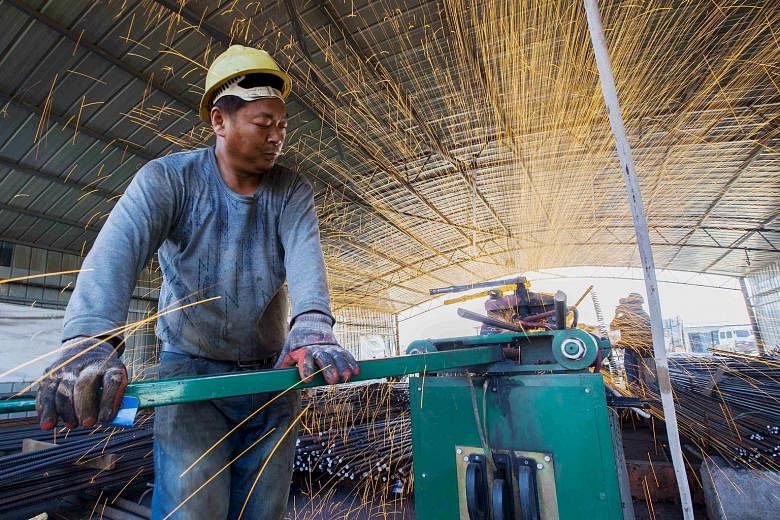BEIJING • For all Chinese Premier Li Keqiang's rhetoric about unrelenting economic reform, companies listed in Shanghai are building up debt at the fastest pace in three years as it gets harder to finance growth from earnings.
Total debt at 1,003 Shanghai-traded non-financial firms rose 18 per cent in the last 12 months, the fastest pace in three years, to a record 868.3 billion yuan (S$192.4 billion), the latest Bloomberg-compiled filings show. The debt-to-common equity ratio, adjusted for market value, has risen to 123.1 per cent from 121.5 per cent a year ago and 88.7 per cent back in 2010. China's growing debt pile is at odds with Mr Li's vow to rebalance the world's second-largest economy and reform bloated state-owned enterprises.
Banks are straining under the most non-performing loans since 2008 while efforts to make the equity market an avenue for deleveraging ended in a market collapse and a freeze in initial public offerings in July. "The long-awaited deleveraging of China's corporate sector hasn't started yet," said chief economist for Asia Xia Le of Banco Bilbao Vizcaya Argentaria in Hong Kong. "Firms are still piling up debt in support of their capital spending."
About 16 per cent of firms listed on the Shanghai stock exchange generated losses in the last 12 months, more than double that a year ago, Bloomberg-compiled data shows.
Government, corporate and household obligations swelled to US$28.2 trillion (S$39.8 trillion) or 282 per cent of China's gross domestic product as of mid-2014, according to McKinsey & Co, and in April, a state-owned enterprise became the first to miss an onshore payment obligation.
Unadjusted, the average debt-to- common equity ratio looks even worse, at 205.7 per cent, the highest in at least a decade. Eleven firms have a ratio exceeding 1,000 per cent. Onshore bond sales from non- financial companies total 3.1 trillion yuan this year, up from 2.4 trillion yuan the same period last year, Bloomberg-complied data shows.
The Shanghai Composite Index has now fallen 39.7 per cent from its June 12 peak after losing 2.7 per cent yesterday, the most in three weeks.
Weaker demand for Chinese goods could add to the stress facing those firms that rely on selling their wares to the rest of the world. Exports fell for a second consecutive month in August, and though the People's Bank of China devalued the yuan last month, a move some economists said was to tackle weakening exports, any impact has yet to show.
"Policymakers intend to reduce leverage in the economy, but they're also trying to make it a smooth process," said Beijing- based analyst Zhu Qibing of China Minzu Securities. "That's why the government has focused on developing the bond market as a financing venue for Chinese companies."
Borrowing expenses for smaller, private-sector firms are also still elevated, with Wenzhou Private Finance Index data putting funding costs for small to medium-sized enterprises at 17.5 per cent on a national level versus a one-year benchmark lending rate of 4.6 per cent.
The rising debt-to-equity ratio of listed firms "shows that the wealth creation in China heavily relies on credit expansion", said chief China economist Zhao Yang of Nomura Holdings in Hong Kong. Firms already have a lot of debt and taking on more may be dangerous, he said.
"The balance sheets of Chinese corporations are overstretched," Mr Paul Gruenwald, Standard & Poor's Asia-Pacific chief economist in Hong Kong, said. "You can't pile on more debt and double up. It's just not the way out any more when the economy is slowing."
BLOOMBERG

